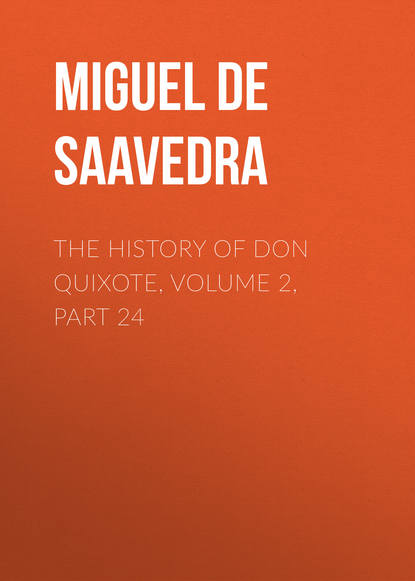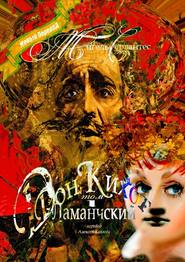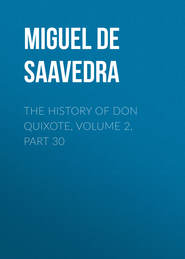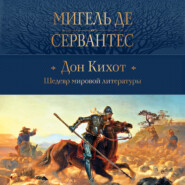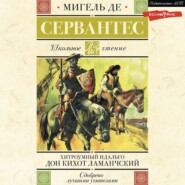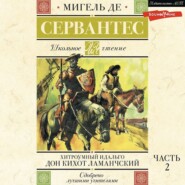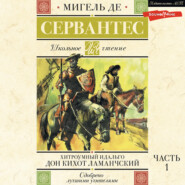По всем вопросам обращайтесь на: info@litportal.ru
(©) 2003-2025.
✖
The History of Don Quixote, Volume 2, Part 24
Настройки чтения
Размер шрифта
Высота строк
Поля
Miguel Cervantes
Miguel de Cervantes Saavedra
The History of Don Quixote, Volume 2, Part 24
CHAPTER XXI.
IN WHICH CAMACHO'S WEDDING IS CONTINUED, WITH OTHER DELIGHTFUL INCIDENTS
While Don Quixote and Sancho were engaged in the discussion set forth the last chapter, they heard loud shouts and a great noise, which were uttered and made by the men on the mares as they went at full gallop, shouting, to receive the bride and bridegroom, who were approaching with musical instruments and pageantry of all sorts around them, and accompanied by the priest and the relatives of both, and all the most distinguished people of the surrounding villages. When Sancho saw the bride, he exclaimed, "By my faith, she is not dressed like a country girl, but like some fine court lady; egad, as well as I can make out, the patena she wears rich coral, and her green Cuenca stuff is thirty-pile velvet; and then the white linen trimming – by my oath, but it's satin! Look at her hands – jet rings on them! May I never have luck if they're not gold rings, and real gold, and set with pearls as white as a curdled milk, and every one of them worth an eye of one's head! Whoreson baggage, what hair she has! if it's not a wig, I never saw longer or fairer all the days of my life. See how bravely she bears herself – and her shape! Wouldn't you say she was like a walking palm tree loaded with clusters of dates? for the trinkets she has hanging from her hair and neck look just like them. I swear in my heart she is a brave lass, and fit 'to pass over the banks of Flanders.'"
Don Quixote laughed at Sancho's boorish eulogies and thought that, saving his lady Dulcinea del Toboso, he had never seen a more beautiful woman. The fair Quiteria appeared somewhat pale, which was, no doubt, because of the bad night brides always pass dressing themselves out for their wedding on the morrow. They advanced towards a theatre that stood on one side of the meadow decked with carpets and boughs, where they were to plight their troth, and from which they were to behold the dances and plays; but at the moment of their arrival at the spot they heard a loud outcry behind them, and a voice exclaiming, "Wait a little, ye, as inconsiderate as ye are hasty!" At these words all turned round, and perceived that the speaker was a man clad in what seemed to be a loose black coat garnished with crimson patches like flames. He was crowned (as was presently seen) with a crown of gloomy cypress, and in his hand he held a long staff. As he approached he was recognised by everyone as the gay Basilio, and all waited anxiously to see what would come of his words, in dread of some catastrophe in consequence of his appearance at such a moment. He came up at last weary and breathless, and planting himself in front of the bridal pair, drove his staff, which had a steel spike at the end, into the ground, and, with a pale face and eyes fixed on Quiteria, he thus addressed her in a hoarse, trembling voice:
"Well dost thou know, ungrateful Quiteria, that according to the holy law we acknowledge, so long as live thou canst take no husband; nor art thou ignorant either that, in my hopes that time and my own exertions would improve my fortunes, I have never failed to observe the respect due to thy honour; but thou, casting behind thee all thou owest to my true love, wouldst surrender what is mine to another whose wealth serves to bring him not only good fortune but supreme happiness; and now to complete it (not that I think he deserves it, but inasmuch as heaven is pleased to bestow it upon him), I will, with my own hands, do away with the obstacle that may interfere with it, and remove myself from between you. Long live the rich Camacho! many a happy year may he live with the ungrateful Quiteria! and let the poor Basilio die, Basilio whose poverty clipped the wings of his happiness, and brought him to the grave!"





